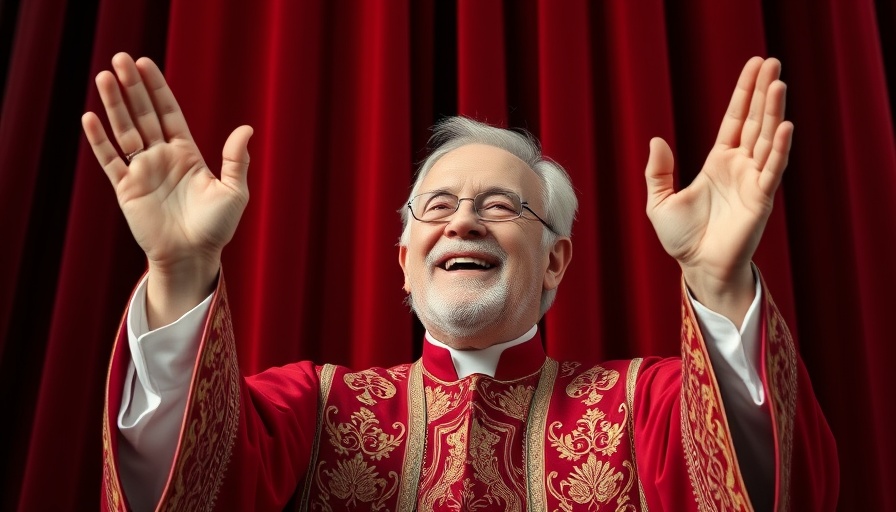
Historic Election Marks New Era for the Catholic Church
The election of Cardinal Robert Prevost as Pope Leo XIV represents a pivotal moment not only for the Catholic Church, but also for the global political landscape. As the first Pope from the United States, expectations are high that his papacy will bridge gaps and help unify diverse communities around pressing global issues. His election was met with cheers and hope from prominent leaders across the globe, each interpreting it through their unique cultural and political lenses.
A Broad Spectrum of Reactions
President Cyril Ramaphosa hailed the election of Pope Leo XIV as a profound moment for both the Catholic Church and the global community. This sentiment was echoed across the political spectrum in the United States, with former presidents Barack Obama and George W. Bush extending their congratulations. They emphasized the significance of Cardinal Prevost’s leadership style as one that could resonate with many, transcending religious borders and speaking to shared human values.
In the United Kingdom, British Prime Minister Keir Starmer noted the historic nature of this election, highlighting the potential for the new pontiff to address global challenges such as climate change and poverty. Similarly, Italian Prime Minister Giorgia Meloni expressed a desire for Pope Leo XIV to guide moral and spiritual discussions within the Church and society. Interesting reactions also came from international leaders like Russian President Vladimir Putin, who emphasized continued cooperation on shared Christian values. This diverse outpouring illustrates how the election of a religious leader can have geopolitical implications.
The Implications for Global Leadership
As the world confronts multifaceted issues ranging from climate change and economic recovery to global health crises like COVID-19, Pope Leo XIV's emerging leadership may play a crucial role. His unique perspective as an American leader could infuse new vigor into the Church’s engagement on these topics. Many observers are curious to see how he will approach advocacy for racial equality and LGBTQ+ rights, areas where global Catholicism has often faced backlash.
Moreover, Pope Francis' legacy placed a strong emphasis on reform, and Pope Leo XIV may carry this vision forward, particularly in fostering dialogue surrounding essential governmental topics like education reforms and international trade agreements. These issues resonate deeply within the socio-political climate of the United States, intertwining with discussions regarding National elections and the effectiveness of government policies that affect all citizens.
Cardinal Prevost's Leadership Style
Cardinal Prevost's ascent comes at a time when many are calling for accountability and transparency within both the Church and broader political frameworks. This moment prompts essential questions about how he might approach themes of corruption, service delivery, and economic disparities both domestically and globally. His unique insights as a former leader in various capacities could allow him to navigate these issues delicately.
The recent history of corruption investigations and the state capture narrative in South Africa, for example, suggests that authenticity in leadership is critical. Followers often crave leaders who demonstrate integrity and moral clarity. As Cardinal Prevost steps into his role, how he balances tradition with contemporary issues will be closely monitored and debated.
Public Sentiment and Future Expectations
This unexpected election has drawn a wave of optimism among those hoping for transformative changes within the Catholic Church and beyond. The anticipation around Pope Leo XIV’s papacy could catalyze a renewed focus on critical challenges such as crime prevention strategies, mental health awareness, and the promotion of peace and justice in a tumultuous world.
Yet, it also comes with scrutiny. Will he prioritize direct engagement with social issues, like gender-based violence and education, which reflect pressing local concerns? The public is eager to witness how his pontificate addresses the socio-political milieu, particularly as it relates to the youth and marginalized groups.
The Call for Unity and Action
As we reflect on this historic moment, what remains clear is the call for unity amidst diversity. Whether discussing the South African context or broader global challenges, the time to understand different perspectives and work collaboratively has arrived. It is a moment to encourage dialogue, understanding, and actionable insights that challenge us to step beyond our own boundaries.
The election of Pope Leo XIV serves as a reminder of the power of leadership to inspire change. As members of various communities—be they political, religious, or otherwise—it is incumbent upon us to engage with the discourse this election has ignited. Beyond religious walls and societal norms, the goal should always be to share love and foster reconciliation.
 Add Row
Add Row  Add
Add 




Write A Comment